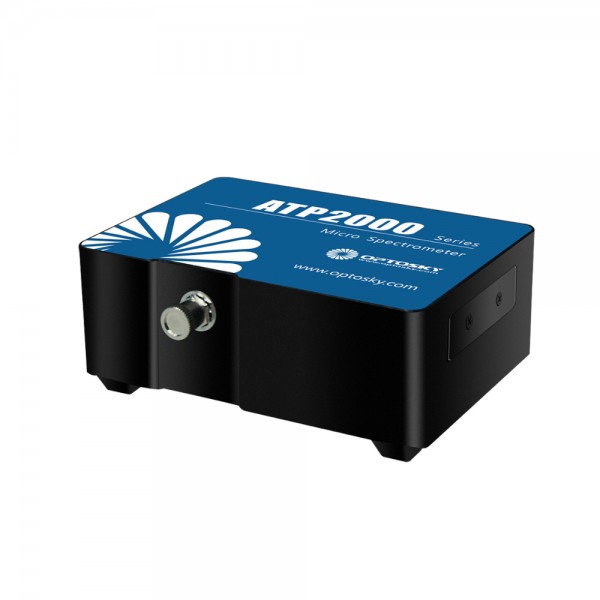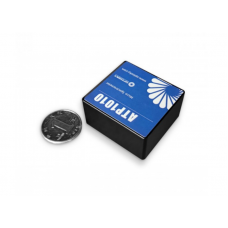With 20 years of experience in the development of optical fiber spectrometers, Optosky has launched a new generation of high-performance ultra-thin optical fiber spectrometers: ATP2000D. It adopts ultra-low noise CCD, and has specially designed ultra-low noise correlated double sampling circuit, 18-bit ultra-low ADC quantizes noise, which greatly reduces the noise of the sensor and obtains an excellent signal-to-noise ratio (about 8 times higher than similar products). ATP2000D can monitor the temperature of the optical platform in real time, thus providing a basis for the implementation of temperature compensation, which greatly improves the measurement reliability of the ATP2000D. The measurement results do not change with the ambient temperature, which is the best level in the industry.
ATP2000D can receive SMA905 fiber input light or free space light, through the USB2.0 or UART port, output the measured spectral data. It only needs a 5V DC power supply or USB power supply, which is very easy to integrate.
Model | Pixel | Cooling |
ATP2000D | 512pixels | No |
ATP2000D-2 | 1024pixels | No |
| Detector | |
| Detector type | Ultra-low noise linear COMS |
| Spectral range | 180-1100 nm |
| Effective pixels | 1024×1 |
| Optical parameter | |
| Optical resolution | 0.3-3.0 nm (depending on slit, spectral range) |
| Incident Interface | SMA905 connector and free space |
| Signal-to-noise | >3000 : 1 |
| Dynamic range | 12000:1 (single sample) |
| Working humidity | < 90%RH (Non-condensate) |
| Wavelength range | 180-1100 nm |
| Physical parameters | |
| Dimensions | 102×72×34 mm^3 |
| Weight | 0.19kg |
| Optical configuration | |
| Optical design | F/4 crossed asymmetrical Czerny-Turner |
| Incident slit | 5, 10, 25, 50, 100, 150, 200μm optional |
| Electrical parameter | |
| A/D conversion resolution | 18 bits |
| Integration time | 0.1ms-256s |
| Interface | USB 2.0 |
| Supply voltage | 5VDC±10% |
| Operating current | 250mA@Typ. |
| Storage temperature | -30°C to +70°C |
| Operating temperature | -25°c to + 50°c |
- Ultra-low noise, down to 5counts p-p
- Built-in ultra-low noise linear detector
- Super small, super thin, super light
- Fiber input, signal output, on the same side, very easy to integrate
- Ultra-low noise CCD signal processing circuit
- Max spectral range: 180- 1180nm
- Spectral resolution: 0.3-3nm
- Optical configuration: crossed Czerny-Turner
- Integration time:0. 1ms- 130s
- Power supply: DC 5V±10% or USB
- Built-in 18-bit ultra-low noise ADC
- Optical input interface: SMA905 or Free space
- Data output interface: USB2.0 (High speed) or UART
- 20-pin connector for interfacing to external products
- Transmittance, reflectance detection
- Fast, ultra microvolume spectrophotometer
- Environmental protection equipment (smoke, water quality)
- Spectral analysis, Radiation spectrophotometric analysis, spectrophotometric analysis
- Laser wavelength measurement
What are Low Cost spectrometer from Optosky?
ATP1XXX & ATP2XXX belongs to low cost spectrometer.
ATP1000 350-1100nm, replace STS
ATP1010 180-1100nm, replace STS and UV enhanced
ATP1012 Xenon lamp driver built-in upgrade from ATP1010
ATP2000P 180-1100nm, higher performance than USB2000+
ATP2000H high speed rate up to 2K or 4K Hz
ATP2002 Xenon lamp driver built-in upgrade from ATP2000P
ATP2100 highest SNR, wave shape can be edited
ATP2110 Water quality analysis spectrometer
ATP2200 180-1100nm, compete with Flame
ATP2400 ultra thin, smaller than USB2000+ performance higher, replace USB2000+
How many topology structure of optical path for a spectrometer?
There are commonly divided into 4 types of optical path, including crossed C-T, M-shape C-T, concave grating optical path, transmittance grating opitcal path.
Crossed C-T: ATP2000P,ATP2002, ATP2400, ATP1010, ATP5020P, ATP5040, ATP6500
M-shape C-T: ATP3030, ATP3034, ATP3330/4 ATP5030, ATP5034, ATP5330/4
Concave grating: ATP4230, ATP4020, ATP4050, ATP4070
let's see the M-shape optical path looks like a number "3", so our models uses the 3rd number "3" to indicate M-shape optical path models.
In generally, topology structure can decide resolution, sensitivity, stray light, and size of a spectrometer.
Crossed C-T topology structure employs better sensitivity and compact size.
M-shape C-T employs higher resolution and better stray light.
Concave grating optical path employs high stray light.
Which modular spectrometer can replace Ocean Insight FLAME-S-VIS-NIR-ES?
Optosky ATP2000 have same performance as Ocean Insight FLAME-S-VIS-NIR-ES, with integration time 1ms-65s, 2048 pixels.











